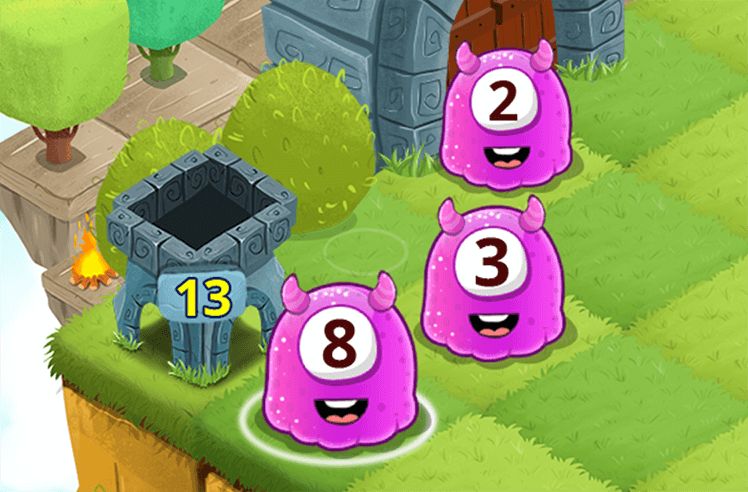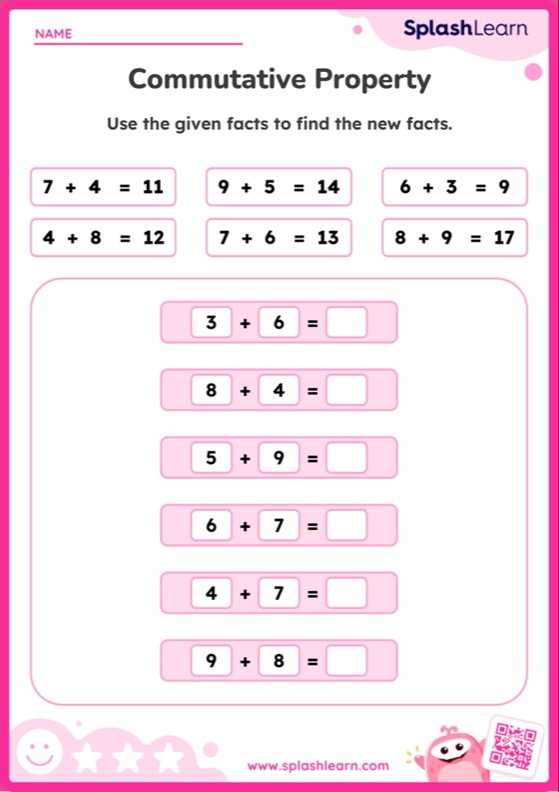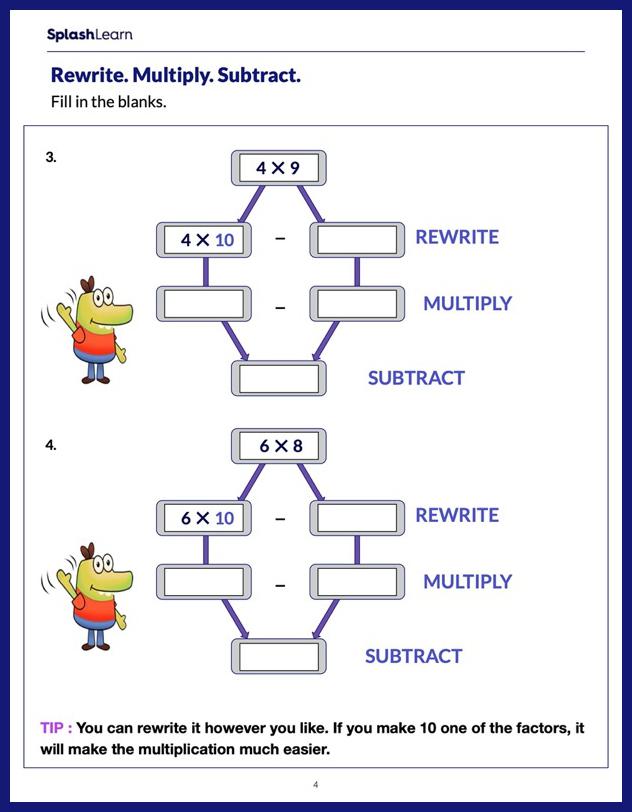What Is the Zero Product Property?
The Zero Product Property states that if $a\times b = 0$, then we must have $a = 0$ or $b = 0$ or both $a = b = 0$. It is also known as the “zero product principle.”
Suppose you multiply two real numbers and get 0 as the product, what can you say about the two numbers? What could the numbers be? When the result from multiplying two numbers is zero, the following two cases are possible
i) one of them is 0
ii) both of them are 0
This idea is called the zero product principle. This property is useful in solving the equations of the form $(x + a)(x + b) = 0$.
Recommended Games
Zero Product Property
If the product of two or more factors equals zero, then at least one of the factors is equal to zero.
It can be written in symbolic form as:
$a \times b = 0 \Leftrightarrow a = 0$, or $b = 0$, or both $a = b = 0$.
In other words, the zero product property means that the product of two non-zero real numbers can never be zero.
Recommended Worksheets
Zero Product Property in Equations
When solving equations, the zero product property can be used to determine the values of the variables. The zero product property is incredibly useful for resolving quadratic equations in the factored forms.
We can extend the zero product property and state that
If $(x + a)(x + b)(x + c)$…$(x + n) = 0$, then
$x + a = 0$ or $x + b = 0$ or … $(x + n)=0$
Example 1: if $(x + a) (x + b) = 0$, then by the zero product property, we can say that
$(x + a) = 0\; or (x + b) = 0$.
Now, solving each of these for x would give the solutions for the given quadratic equation.
Thus, $x = \;-a$ or $x = \;-b$
Example 2: $x(x + 2) (x + 3) = 0$
By the zero product property,
$x = 0$ or $x + 2 = 0$ or $x + 3 = 0$
Thus, $x = 0$, or $x= \;-2$, or $x= \;-3$
Example 3: $(x \;-\; 3) (x + 6) = 0$
Using the zero product property, we know that,
$(x \;-\; 3) = 0$ or $(x + 6) = 0$
$x = 3$ or $x = \;-\; 6$
These are the two solutions of the equation.
Advantages of Zero Product Property
- The zero product property is useful to find values of variables when we have a factored form of the equation. When the product of two or more factors is 0, we can apply the property and simply put each factor equal to 0.
- The zero product property helps in solving the equations of the form $(x + a)(x + b)(x + c)$….$(x + n) =0$.
- The zero product property is particularly helpful in solving quadratic equations.
- If we have an equation of the form nx=0, where n is a non-zero real number and x is a variable, we can apply the zero product property and conclude that x=0.
Disadvantages of Zero Product Property
- Zero product property cannot be applied to matrices. It means that the product of two non-zero matrices can be 0.
- Zero product property is not applicable to the vectors as well. Two non-zero vectors, when multiplied, can result in a zero vector.
- We can apply the zero product property to solve equations if and only if we have the factored form. We must know how to factorize the given equation before we can apply the property.
Facts about Zero Product Property
- The product of two non-zero real numbers can never be 0.
- Zero Product Property is also known as zero product principle, zero product property of multiplication, the null factor law, the null factor theorem, the nonexistence of nontrivial zero divisors, the zero product rule.
- The zero product property allows us to factor equations and solve them.
- According to the zero product rule, if the product of any number of expressions is 0, then at least one of them must also be zero.
- You can use the zero product property only if the expression is in the factored form and set to 0.
- The zero product rule is satisfied by the set of real numbers, integers, rational numbers, whole numbers, natural numbers.
Conclusion
In this article, we have learned about zero product property. The zero product property allows us to factor equations and solve them. Now let’s solve some zero product property examples and practice problems for better understanding.
Solved Examples on Zero Product Property
1. Solve the equation using the zero-product property.
$(𝑥 \;−\; 2)(𝑥 \;−\; 5) = 0$
Solution:
$(𝑥 \;−\; 2)(𝑥 \;−\; 5) = 0$
The equation is already in the factored form. So, we will simply apply zero product property to solve the equation.
$𝑥 \;−\;2 = 0$ or $𝑥\;−\;5 = 0$
$x \;-\; 2 + 2 = 0 + 2$ or $x \;-\; 5 + 5 = 0 + 5$
$x = 2$ or $x = 5$
Thus, $x = 2$ or $x = 5$ are the roots.
2. Solve using the zero product property: $2 x^2 \;−\; 3x \;−\; 5 = 0$
Solution:
We will factorize the equation first.
$2x^2 \;−\; 3x \;−\; 5 = 0$
$(2𝑥 \;−\; 5)(𝑥 + 1) = 0$
$2𝑥 \;−\; 5 = 0$ or $x + 1 = 0$
$2x = 5$ or $x + 1 \;-\; 1 = 0 \;-\; 1$
$\frac{2x}{2} = \frac{5}{2}$ or $x = \;-\; 1$
$x = \frac{5}{2}$ or $x = \;-\; 1$
Thus, the solutions are $x = \frac{5}{2}$ or $x = \;-1$.
3. Find the roots of the cubic equation which is in factored form: $(x + 2)^2 (3x + 2)= 0$.
Solution:
We can write the given equation $(x + 2)^2 (3x + 2)= 0$ as
$(x + 2)( x + 2)(3x + 2) = 0$
By the zero product property, we have $-\; 2$, and $-\; 23$.
4. What is the value of x if $99x = 0$?
Solution:
The zero product property says that if the product of two numbers is 0, then at least one of the numbers is 0.
We have $99x = 0$
Here, 99 is a constant.
$99 \neq 0$
Thus, by the zero product property, we have $x = 0$.
5. Using the zero product property, solve the following for x.
$10x(x + 2)(x \;-\; 5)(4x + 12)$
Solution:
If $10x(x + 2)(x \;-\; 5)(4x + 12)= 0$, at least one of the factors is 0.
| i) $10x = 0$ $\Rightarrow x = 0$ | ii) $x + 2 = 0$ $\Rightarrow x + 2 \;-\; 2 = 0 \;-\; 2$ $\Rightarrow x + 0 = \;-\;2$ $\Rightarrow x = \;-2$ |
| iii) $x \;-\; 5 = 0$ $\Rightarrow x \;-\; 5 + 5 = 0 + 5$ $\Rightarrow x + 0 = 0 + 5$ $\Rightarrow x = 5$ | iv) $4x + 12 = 0$ $\Rightarrow 4x + 12 \;-\;12 = 0 \;-\; 12$ $\Rightarrow 4x + 0 = \;-12$ $\Rightarrow 4x = \;-12$ $\Rightarrow \frac{4x}{4} = \;- \frac{12}{4}$ $\Rightarrow x = \;-\; 3$ |
The possible roots to the equation are $0,\; -\;2,\; 5,\; -\; 3$.
Practice Problems on Zero Product Property
Zero Product Property: Definition, Formula, Examples
If a.b $= 0$, then $a = 0$ or $b = 0$ or $a = b = 0$.
According to zero product property, if $𝑎 \times 𝑏 = 0$ then either $𝑎 = 0$ or $𝑏 = 0$ or both a and b are equal to zero.
If $5 \times x = 0$ then, _________.
If $5 \times x = 0$ then, the value of x must be zero.
Solve for x:
$(x + 2)(x \;-\; 3) = 0$
$(x + 2)(x \;-\; 3) = 0$.
$x + 2 = 0$ or $x \;-\; 3 = 0$
Thus, $x = \;-\; 2$ or $x = 3$
The product of two non-zero real numbers is
The product of two non-zero real numbers can never be 0.
The zero product property states that for any real numbers and b, if $ab = 0$, then
For any real numbers a and b, if $ab = 0$, then, either $a = 0$, or $b = 0$, or both a and b equal to zero
Frequently Asked Questions on Zero Product Property
What is the associative property of multiplication?
According to the associative property of multiplication, the product of any three numbers remains the same, irrespective of the order in which they are grouped.$a\times(b\times c) = (a\times b) c$
What is the identity property of multiplication?
The identity property of multiplication states that the product of any real number with 1 is always the number itself. The number 1 is called the multiplicative identity.
Why is the zero product property not applicable for matrices ?
For matrices, the zero product property is not applicable, because if the product of two matrices is a zero matrix, then it is not compulsory that one of the matrices should be a zero matrix.
What is the additive identity for real numbers?
0 is the additive identity for the set of real numbers. Addition of any real number with 0 is the number itself.
How to apply the zero product property?
To apply the zero product property, we set each factor equal to zero and solve for the variable. The zero product property can be applied when the product of the expressions is equal to zero.




































